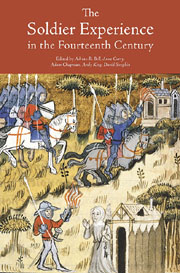Book contents
- Frontmatter
- Contents
- List of Contributors
- List of Abbreviations
- Introduction
- 1 Military Service and the Dynamics of Recruitment in Fourteenth-Century England
- 2 Total War in the Middle Ages? The Contribution of English Landed Society to the Wars of Edward I and Edward II
- 3 A Warlike People? Gentry Enthusiasm for Edward I's Scottish Campaigns, 1296–1307
- 4 Edward I's Centurions: Professional Soldiers in an Era of Militia Armies
- 5 Who's afraid of the Big Bad Bruce? Balliol Scots and ‘English Scots’ during the Second Scottish War of Independence
- 6 Rebels, Uchelwyr and Parvenus: Welsh Knights in the Fourteenth Century
- 7 Breton Soldiers from the Battle of the Thirty (26 March 1351) to Nicopolis (25 September 1396)
- 8 Towards a Rehabilitation of Froissart's Credibility: The Non Fictitious Bascot de Mauléon
- 9 The English Reversal of Fortunes in the 1370s and the Experience of Prisoners of War
- 10 The Soldier, ‘hadde he riden, no man ferre’
- Index
- Warfare in History
8 - Towards a Rehabilitation of Froissart's Credibility: The Non Fictitious Bascot de Mauléon
Published online by Cambridge University Press: 05 February 2013
- Frontmatter
- Contents
- List of Contributors
- List of Abbreviations
- Introduction
- 1 Military Service and the Dynamics of Recruitment in Fourteenth-Century England
- 2 Total War in the Middle Ages? The Contribution of English Landed Society to the Wars of Edward I and Edward II
- 3 A Warlike People? Gentry Enthusiasm for Edward I's Scottish Campaigns, 1296–1307
- 4 Edward I's Centurions: Professional Soldiers in an Era of Militia Armies
- 5 Who's afraid of the Big Bad Bruce? Balliol Scots and ‘English Scots’ during the Second Scottish War of Independence
- 6 Rebels, Uchelwyr and Parvenus: Welsh Knights in the Fourteenth Century
- 7 Breton Soldiers from the Battle of the Thirty (26 March 1351) to Nicopolis (25 September 1396)
- 8 Towards a Rehabilitation of Froissart's Credibility: The Non Fictitious Bascot de Mauléon
- 9 The English Reversal of Fortunes in the 1370s and the Experience of Prisoners of War
- 10 The Soldier, ‘hadde he riden, no man ferre’
- Index
- Warfare in History
Summary
In the chronicles of Jean Froissart, one of the most famous passages is the interview by the author of the Gascon routier named the Bascot de Mauléon (given as Maulion in the text) which took place when Froissart was in Orthez to meet Gaston Fébus, count of Foix and vicomte of Béarn, in early December 1388. This passage in Book Three of Froissart's chronicles has been used many times by historians to illustrate the life of a typical mercenary of the fourteenth century as it provides the only contemporary coherent narrative of the routiers' history stretching from 1356 to the 1380s. But in 2001 Kenneth Fowler suggested in his book Medieval Mercenaries that the Bascot de Mauléon was ‘possibly a figure of Froissart's imagination, created to tell the story himself ’, since Fowler did not find any record of the existence of the Bascot de Mauléon in archival sources. Curiously enough, although it was only a supposition on Fowler's part, it seems that many medievalists have now begun to think that the Bascot probably never existed and that Froissart's interview was an elaborate forgery based on different testimonies. In fact, a clutch of reliable contemporary documents mention the Bascot de Mauléon holding a ‘fortress’ and acknowledging the authority of the king of England. This case study of his career will permit us to understand better the life of many Anglo-Gascon routiers of the second rank in the second half of the fourteenth century.
- Type
- Chapter
- Information
- The Soldier Experience in the Fourteenth Centur , pp. 175 - 190Publisher: Boydell & BrewerPrint publication year: 2011



